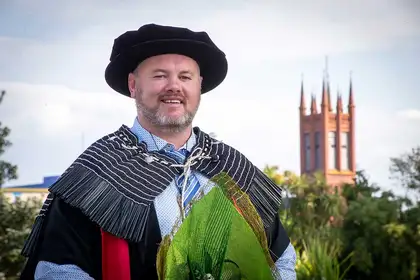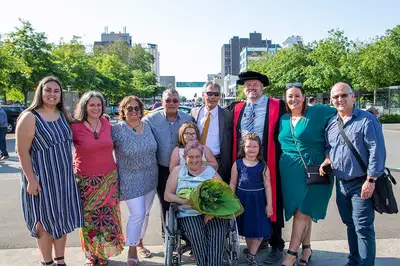
Dr Jeremy Hapeta graduated with his doctorate in November.
PhD graduate Dr Jeremy Hapeta, Ngāti Raukawa, Ngāti Huia, says he became a “brain surgeon” straight out of school – in the offal room of a Levin abattoir.
After leaving Manawatū College with no qualifications, he spent two years working there, but dreamt of a university education. He says the role taught him transferable skills that helped to shape his future – early start times at 5am and a strong work ethic. He demonstrated resilience to persevere through two unsuccessful attempts to attend university before turning 20, and was eventually accepted as a “second-chance” learner into the Bachelor of Education programme.
Today, Dr Hapeta is a physical education lecturer at Massey University’s School of Sport, Exercise and Nutrition. Over six years, part-time, he has worked towards his PhD investigating the inclusion of Māori culture when developing rugby team culture. He also explored the impact of these inclusive (or exclusionary) practices on wellbeing for rugby players, coaches and administrators.
A former professional rugby player in New Zealand, Japan, France and Italy, he looks back at his time at secondary school and wishes he had applied the same grit and determination to his studies as he did crafting his sport skills. He hopes his “non-traditional” pathway to gaining his PhD can inspire others to achieve academic success if they put their minds to it.
“It is the end of a long journey; it is extremely satisfying for me, my wife, our two children and wider whānau,” he says.
“I wish I had made the connection earlier that everything I was doing in sport, those skills and tools, could be applied to my school work. But getting my PhD demonstrates that just because I skipped a few steps in terms of gaining high school qualifications, it does not necessarily mean the doors are closed to higher education.
“I didn’t receive the equivalent of NCEA level one, two or three, but here I am with level 10.”

Dr Hapeta with his whānau at graduation in Manawatū.
Māori tradition in sport development
Dr Hapeta’s interest in his PhD topic began when he noticed Māori culture being increasingly incorporated into the development of sport teams. He was interested in the impact this was having on wellbeing for the people involved, both Māori and non-Māori.
His research led him to work with the Bay of Plenty Steamers, Taranaki Rugby’s Māori and Pasifika Rugby Academy (MPRA) and the New Zealand Māori U18s team, where he studied their approaches to cultural inclusion. The different ages and ethnicities of focus groups meant his research came from multiple perspectives.
He says, at times, he was surprised at the impact Māori traditions had for non-Māori players. For example, the Steamers undertook an exercise where the team had to research the various maunga within the Bay of Plenty region so they understood the geographic area they were representing.
“It quite literally grounded the players and gave them a sense of belonging. It was a really inclusive initiative that made people feel like they were a part of something much bigger.”
This process was not focused on performance-based outcomes, but the team’s leadership recognised the benefits of getting the off-the-field elements right.
“What stood out to me was their recognition of building solid foundations. They thought, ‘If we grow and nourish this side of the team and their connection to where they are playing, and allow it to flourish, some of the fruits this process will bear are strong outcomes.’ In one interview a coach even talked about being a better dad at home to his teenaged children”.
And their off-field pillars appear to have paid off on-field with this change in direction. The Bay of Plenty Steamers went from last placed in 2013 and 2014 to winning the Mitre 10 Championship in 2019 and gaining promotion to the Premiership for the 2020 season.
A traditional approach to research
Hapeta’s research utilised an approach known as pūrākau, or traditional narratives and storytelling, which acknowledges the past, present and future.
“In Te Ao Māori we walk ‘backwards’ into our future. We stare at our past, something that is known, as we walk towards the unknown future. This is what I would like to think my PhD contribution makes, it is about putting a pou or peg into the ground now so that we can progress and move forwards into a more culturally inclusive future. I hope the findings of my research might inform why and how Māori practices can be used to develop team culture."
He says working with the younger men who were part of the MPRA academy provided fascinating insights into their future aspirations, which were not centred around playing rugby professionally.
“What the academy was doing wasn’t about rugby, it was actually about life skills. Their second-chance learners weren’t treated like athletes, they were treated as people and rugby was the vehicle used to embed values into them like respect, forgiveness and work ethic. Many youth spoke of future aspirations like building their own home and furniture. One was returning to mainstream school so he could do his building apprenticeship, the majority of others exited into employment.”
Inspiring others to further their education
Dr Hapeta hopes his story may inspire people of different ages and backgrounds and that his research will contribute to positive Māori stories.
“I’d like my research to reaffirm our cultural identity, increasing the mana of Māori and serve as a catalyst for other groups to recognise the value and potential that they could tap into.”
His advice for current students, or those considering studying but are hesitant to? Just do it.
“I hope in some small way I might provide an example that you don’t need to be a genius or rocket scientist to walk across the stage and get your degree, if I can do it, anyone can.
“And don’t be disheartened by setbacks. If I had listened to and accepted my first two rejection letters, I would not have applied a third time (lucky). It took me six years of part-time study to do this PhD. It was a struggle and didn’t come easily and that’s okay too.”